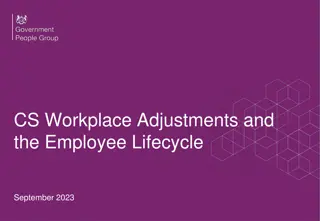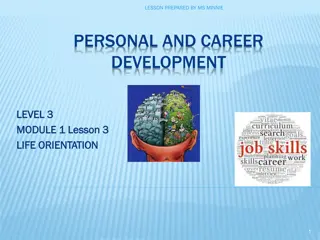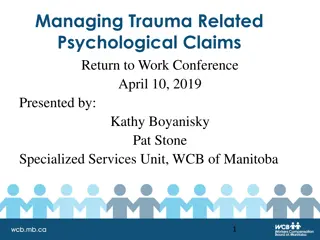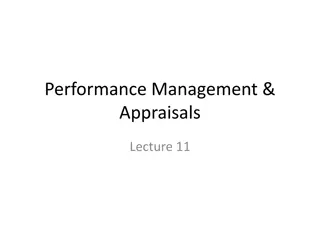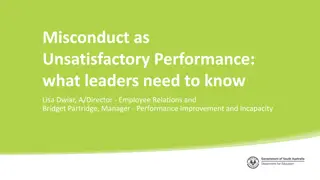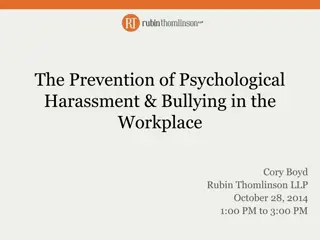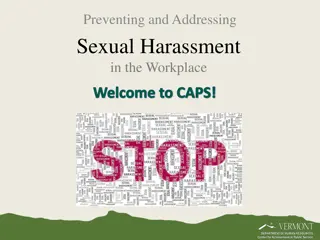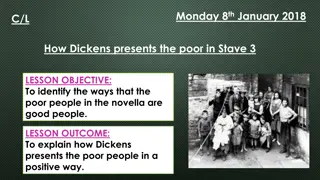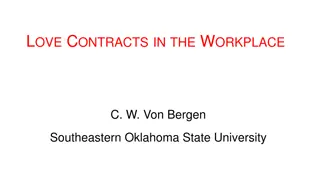Effective Strategies for Managing Poor Performance in the Workplace
Explore the challenges and considerations surrounding poor performance in the workplace, including its impact on the organization, potential causes, and upcoming changes regarding probationary period dismissals. Learn about unfair dismissal protection, practical tips, and strategies to address poor performance effectively while avoiding legal risks.
Download Presentation

Please find below an Image/Link to download the presentation.
The content on the website is provided AS IS for your information and personal use only. It may not be sold, licensed, or shared on other websites without obtaining consent from the author. Download presentation by click this link. If you encounter any issues during the download, it is possible that the publisher has removed the file from their server.
E N D
Presentation Transcript
Managing poor performance in the workplace Innes Clark and Elise Turner MFMac Employment Law Team
Discussion points Background considerations Unfair dismissal proposed changes and probationary period dismissals What the Tribunal expects to see in performance dismissals Poor performance and its interaction with law on disability and age discrimination Protected conversations Practical tips Case studies
Poor performance Impact on the organisation Reduced productivity Lower team morale Potential damage to company reputation Increased recruitment costs Potential causes Skill deficiency lack of training/inadequate understanding of job Personal issues health/family problems/disability Workplace factors - poor management/unclear goals/excessive workload/lack of resources Motivational issues lack of job satisfaction or engagement Not the right fit for the particular job
Probationary period dismissals Upcoming changes Unfair dismissal protection is to become a day 1 right This will not prevent fair dismissal, which includes dismissal for reasons of capability, conduct or redundancy, or probationary periods with fair and transparent rules and processes. We will ensure employers can operate probationary periods to assess new hires Labour s Plan to Make Work Pay, June 2024 Labour s Plan to Make Work Pay, June 2024 How might this work in practice? Failing probation becomes new fair reason for dismissal?
Probationary period dismissals Many unanswered questions about the upcoming changes including:- Will the length of probationary periods be determined by individual employers or statute? Will extensions be possible? Will dismissal be possible at any stage of the probationary period or only at the end?
Probationary period dismissals Current risks Discrimination e.g. disability discrimination Automatically unfair dismissal e.g. whistleblowing
Probationary period dismissals Tighter recruitment procedures Analyse job description to identify required hard, soft and cognitive skills Recruit for required skills using appropriate assessments Identify at outset any development needs and train/plan from day 1 Actively monitor performance during PP - ensure managers are well trained Have open communications with the employee re performance with a structure for supervision System in place to review whether to sign off on PP Extend the PP if necessary Communicate a decision as to satisfactory completion (or otherwise) shortly before the PP ends Record all discussions in writing and follow up conversations by email Avoid surprises
Performance dismissals - what an ET expects to see Required standards clearly communicated to employees Early identification of underperformance Informal efforts to resolve matters Application of a fair and consistent process Improvement plan setting measurable goals with realistic timelines i.e. opportunity to improve
Performance dismissals - what an ET expects to see Provision of support and training Regular discussions and feedback Evidence of poor performance/specific examples Series of warnings first, final, dismissal Right of appeal ACAS Code of Practice on Disciplinary and Grievance Procedures Paper trail is very important!
Poor performance and disability If a disability is identified as impacting performance, any decisions such as warnings or dismissal will need to be a proportionate way of achieving a legitimate aim Obligation to make reasonable adjustments to the role to the performance management process Remember hidden disabilities such as neurodiversity Remember knowledge of disability need not be actual it can be what the employer is reasonably expected to know irrespective of medical advice or information from the employee
Performance and age Interplay with disability Do not make assumptions about age being a factor in under- performance Consistently apply standards irrespective of age Ensure performance criteria are not discriminatory Ensure equal access to support and training Avoid discriminatory language Consistent, transparent and well documented decision-making can be used to rebut any inference of age discrimination Both direct and indirect age discrimination may be justified in appropriate circumstances but this is not a licence to discriminate
Protected conversations Covers Any offer made or discussions held, before termination of the employment in question, with a view to it being terminated on terms agreed between the employer and employee In some cases may be a more attractive option than performance management procedure Beware inadmissibility rule only applies to ordinary unfair dismissal claims, not discrimination claims
Practical tips Intervene early don t let things escalate Train managers on what requires to be done Do due diligence - investigate the problem evidence? Check contractual terms and policies before dismissing Keep written records of all discussions and follow up meetings in writing (can be by email), including confirming any targets/timescales Be clear about the consequences of performance not improving Ensure appraisals are accurate rather than rose-tinted Follow a fair procedure Never rush into any decision to dismiss Avoid surprises
Final thoughts Structured continuous performance management for all employees 6 monthly talent reviews to identify:- high performers promotion candidates flight risks performance issues training/development needs
Case study 1 Wright-Turner v London Borough of Hammersmith and Fulham 4.6 million award for probationary dismissal Employer criticised for failing to follow the provisions or spirit of the Probationary Procedure Director of Public Services Reform Claimant had ADHD Diagnosed also with PTSD
Case study 1 Wright-Turner v London Borough of Hammersmith and Fulham Line manager s perception of her was impacted by finding out that claimant had ADHD Invited to meeting to discuss her ADHD inappropriately handled claimant suffered severe panic attack later that day Signed off work for a month with PTSD/acute anxiety Probationary period extended by 3 months when signed off Dismissed at end of probationary period Dismissal letter lacking in substance/no details re: alleged unsatisfactory performance Evidence of dishonesty by certain employees PTSD was reason for dismissal
Case study 1 Wright-Turner v London Borough of Hammersmith and Fulham Dismissing during or at end of probationary period carries a risk where employee is disabled Disability discrimination claims are uncapped Claim also raised against line manager Do not make assumptions in relation to any disability If there is a performance issue potentially related to a disability consider carefully what steps to take including reasonable adjustments
Case study 2 Piaszczynski v Leakers Limited Head baker at bakery dismissed due to quality of bread Head baker said out of the blue, surprise, without warning Bakery said spoken to on a number of occasions/left correspondence for Head baker
Case study 2 Piaszczynski v Leakers Limited Employment Tribunal:- Issues raised with Head baker on a number of occasions Bakery not done enough to make clear had been issued with formal warnings Unfair dismissal but compensation reduced by 50% Employee needs to be provided with clear explanation as to under performance Adequate warnings with targets and opportunities for improvement Further training may be appropriate Compliant with ACAS Code









